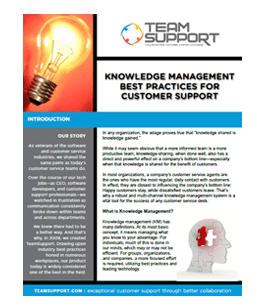The why and how of establishing guidelines
Establishing guidelines for communicating with customers provides customers a consistent experience no matter who they come into contact with. Even in a professional environment, two customer support agents might communicate in radically different ways if left to their own devices. One could be chatty and conversational, while another could respond matter-of-factly. Both agents successfully communicate and assist customers, but their approach is so different that customers are sometimes left confused or frustrated.
Giving agents clear instructions on how they’re supposed to interact with customers ensures everyone receives the same level of care and attention no matter which rep they’re communicating with. For example, you could mandate that all tickets must be responded to within a few hours or that agents begin every email to customers with a personalized greeting. You can get even more specific – urgent tickets should receive a response within an hour, agents should use technical language only in a specific way, or other such guidance that pertains to your business. The guidelines can vary depending on the customer’s service-level agreement, industry, or purchase, but using them helps different agents respond to customers consistently.
There are a few things to keep in mind when creating such guidelines. One is to tailor them to your particular industry. For example, a business that creates computer applications for elementary schools might use appropriate humor and a casual tone, whereas a medical software provider would lean toward being formal and straightforward. Providing guidelines ensures your agents’ tone matches customer expectations. It could be off-putting for a medical insurance company to frequently make jokes, for instance. This is not to say you should write a script for your support team. Your company should be flexible in terms of communication, but you should also maintain a consistent level of professionalism and courtesy.
Consistency through customer support software
B2B customer support software can also help establish consistency with tools like customer databases and automatic alert messages. With customer alerts, agents receive important information as soon as they click on a customer’s account or support ticket. By displaying this information consistently, every agent is aware of the important nuances of a particular customer.
Regardless of what customer communication approach your business takes, your guidelines for phone, chat, and email conversations should be located in a place where every member of your support team can access them. B2B customer support software provides businesses with internal knowledge bases and wikis that store these guidelines for easy access. Any updates to the documentation are saved in real time, ensuring everyone is consistently on the same page. This also means that all agents are notified of any changes to the guidelines without each editor having to constantly email new updates and lose track of versions . They can also cycle through previous versions to see what exactly has changed. Additionally, because this software is accessible through the cloud, your agents can refer to these guidelines even when they’re out of the office.
Marketing Profs had some good advice for B2B organizations: create a “single source of truth” to store customer information like main contacts and past purchases. This way, every agent has the same information and can address the specific needs of your customers in a consistent fashion, no matter who ends up addressing the support ticket.
B2B customer support software can serve as this source of truth for your agents. It stores important information such as primary customer contacts, service agreements, business locations, parent and child companies, and more. Access to this information is important because it eliminates discrepancies that could have a critical impact on your business. For example, imagine most of your customers have a service contract that provides 12 months of support before they must renew. However, Company X has an agreement in place where they get one extra month added to their first year. This should be noted in the company profile so that every agent who accesses the account will be aware of it. Without access to this “single source of truth” an agent interacting with Company X during the 13th month could mistakenly assume their allotted time for service is over and tell the customer this – obviously upsetting the customer. Having incorrect information puts agents in a bad spot and lowers their credibility. If this happens too often, credibility can’t be restored and business is lost.
Sharing information across teams
“Sharing important details with sales and marketing keeps everyone informed and up-to-date.”
Your business can take consistency a step further with B2B customer support software by supplying the same information across multiple departments. Sharing important details with sales and marketing keeps everyone informed and up-to-date regarding your customers, so everyone in your business is ready and able to talk about whatever your customers need. The benefit of sharing this information is it allows for growth into different divisions of larger companies and can create greater opportunities.
Providing a consistent customer experience is incredibly important for B2B organizations. Doing so increases customer satisfaction, and these happy customers will likely spread news of your business and excellent customer service to their peers. By establishing actionable guidelines and making information accessible to all agents, every member of your customer support team can provide the same quality of service to any one of your customers.




